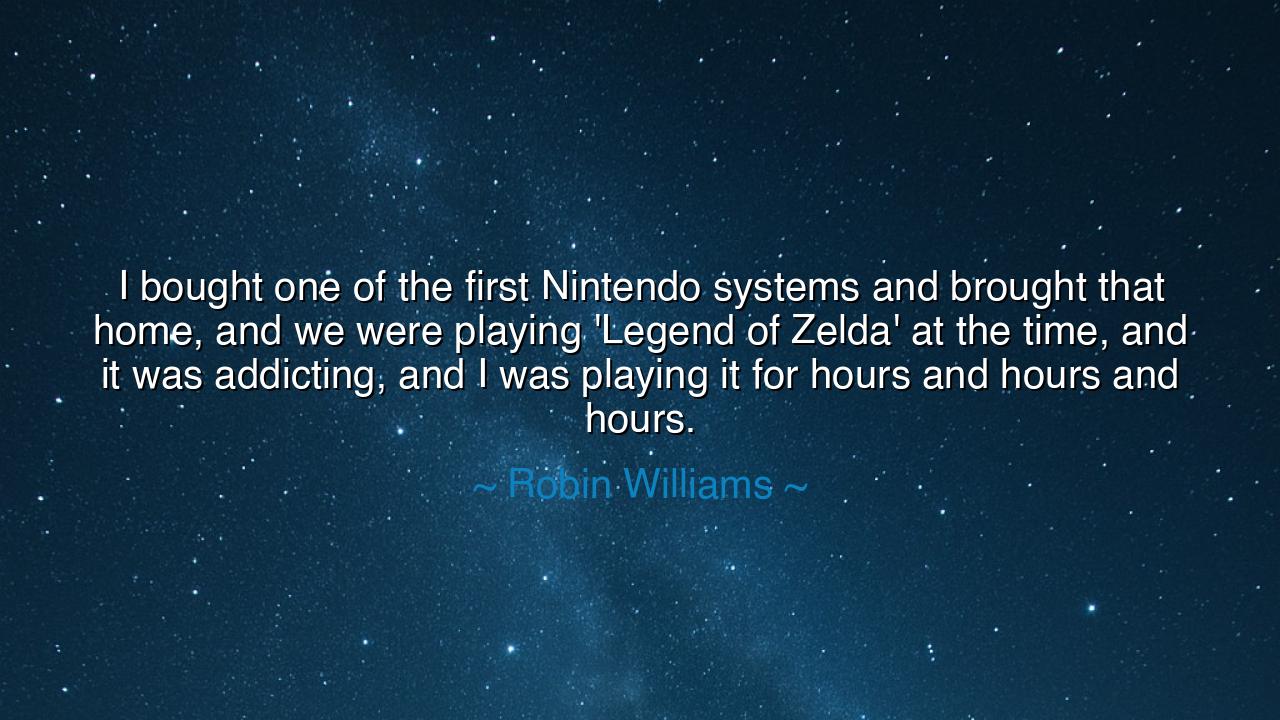
I bought one of the first Nintendo systems and brought that home
I bought one of the first Nintendo systems and brought that home, and we were playing 'Legend of Zelda' at the time, and it was addicting, and I was playing it for hours and hours and hours.






The words of Robin Williams—“I bought one of the first Nintendo systems and brought that home, and we were playing Legend of Zelda at the time, and it was addicting, and I was playing it for hours and hours and hours”—echo with the joyful innocence of discovery and the tender beauty of connection. To the casual ear, they may sound like a fond recollection of leisure, a man remembering the thrill of a new game. But to the thoughtful heart, these words speak of something far deeper: of imagination, of the ancient human hunger for adventure, and of how even the modern worlds we create in pixels and screens can awaken the timeless spirit of wonder that has lived in mankind since the dawn of stories.
In his reflection, Williams touches the eternal thread that binds all ages—the desire to explore worlds beyond our own. The Legend of Zelda, though born of technology, is in truth a modern myth, one that mirrors the great journeys of ancient heroes. Its forests and temples are echoes of Odysseus’s seas, Beowulf’s mead halls, and the shadowed valleys through which Gilgamesh once walked. When Williams says he was “addicted,” it is not addiction in the hollow sense of compulsion—it is enchantment, the surrender of the heart to the sacred fire of curiosity. The same fire that drove early explorers to cross oceans and poets to dream of unseen lands now burns through the luminous gateway of a video game console.
The Nintendo system, that humble machine of plastic and wires, became in his home a portal—a door to a land where imagination and courage reigned supreme. Williams, a man whose craft was storytelling, recognized in Zelda a continuation of the oldest form of art: the quest. The hero sets out from home, armed with little but hope and a sense of destiny. Through battles, puzzles, and trials, he seeks not merely victory, but wisdom. The ancients carved this tale in stone and sang it in fireside songs; the modern world renders it in code and music. And yet the essence remains unchanged. When Williams sat before that glowing screen for “hours and hours,” he was not escaping life—he was engaging the same ancient dance of storytelling that has always connected humanity to its imagination.
There is a particular poignancy in knowing how Robin Williams, a man of immense depth and sensitivity, found joy in this game. For in it, he glimpsed both the childlike wonder and the heroism that marked his own spirit. He even named his daughter Zelda, in honor of that mythical world—a testament to how deeply the story had woven itself into the fabric of his life. In that act, he revealed an eternal truth: that play, when guided by love and imagination, becomes a sacred act. It nourishes the soul, reminding us that even amid the seriousness of life, the heart must have places where it can roam free, unburdened, and brave.
Throughout history, the power of imaginative play has always been a source of creativity and healing. Consider the philosopher Plato, who said that one can discover more about a person in an hour of play than in a year of conversation. Or Albert Einstein, who confessed that imagination was more important than knowledge. Williams, through his laughter and through his art, lived this truth. His hours spent in Zelda’s world were not wasted; they were hours of communion with the spirit of curiosity itself. Like a bard of old learning a new song, he was exploring what it meant to be alive—to wonder, to lose oneself, and to return changed.
But there is another, quieter meaning hidden in his words. When he speaks of bringing the game “home,” he reminds us that the greatest adventures are meant to be shared. The joy of discovery grows deeper when experienced together—between friends, between family, between parent and child. This was not merely Robin Williams, the actor, playing a game; it was a father sharing in the delight of a world with those he loved. And that, too, is ancient: the passing of stories from one generation to another, each retelling keeping the fire of imagination alive.
So, what lesson, then, shall we draw from his memory? It is this: do not lose your sense of wonder. Whether through art, through play, or through the simple joy of discovery, nurture that spark of curiosity that dwells within you. The world will tempt you to grow hard, to trade wonder for weariness—but resist it. Seek out what moves your imagination and fills your heart with awe, for in that pursuit you touch the divine. And remember, as Robin Williams did, that joy is not childish—it is sacred. The ancient spirit of adventure still lives within each of us, waiting for us to pick up the controller, or the pen, or the sword of our own choosing, and embark once more into the realm of endless discovery.
Thus, his words, though playful, are a reminder of something eternal: that in the act of playing, we remember how to live. The game ends, the screen fades, but the feeling remains—that sense of awe, that connection to imagination, that reminder that even in a modern world of circuits and screens, the human soul still yearns for quests, courage, and wonder. And so we honor Robin Williams not just for his laughter, but for his wisdom—that even in play, there lies a path to meaning, and even in the smallest moments of joy, there beats the heart of the hero’s journey.






AAdministratorAdministrator
Welcome, honored guests. Please leave a comment, we will respond soon